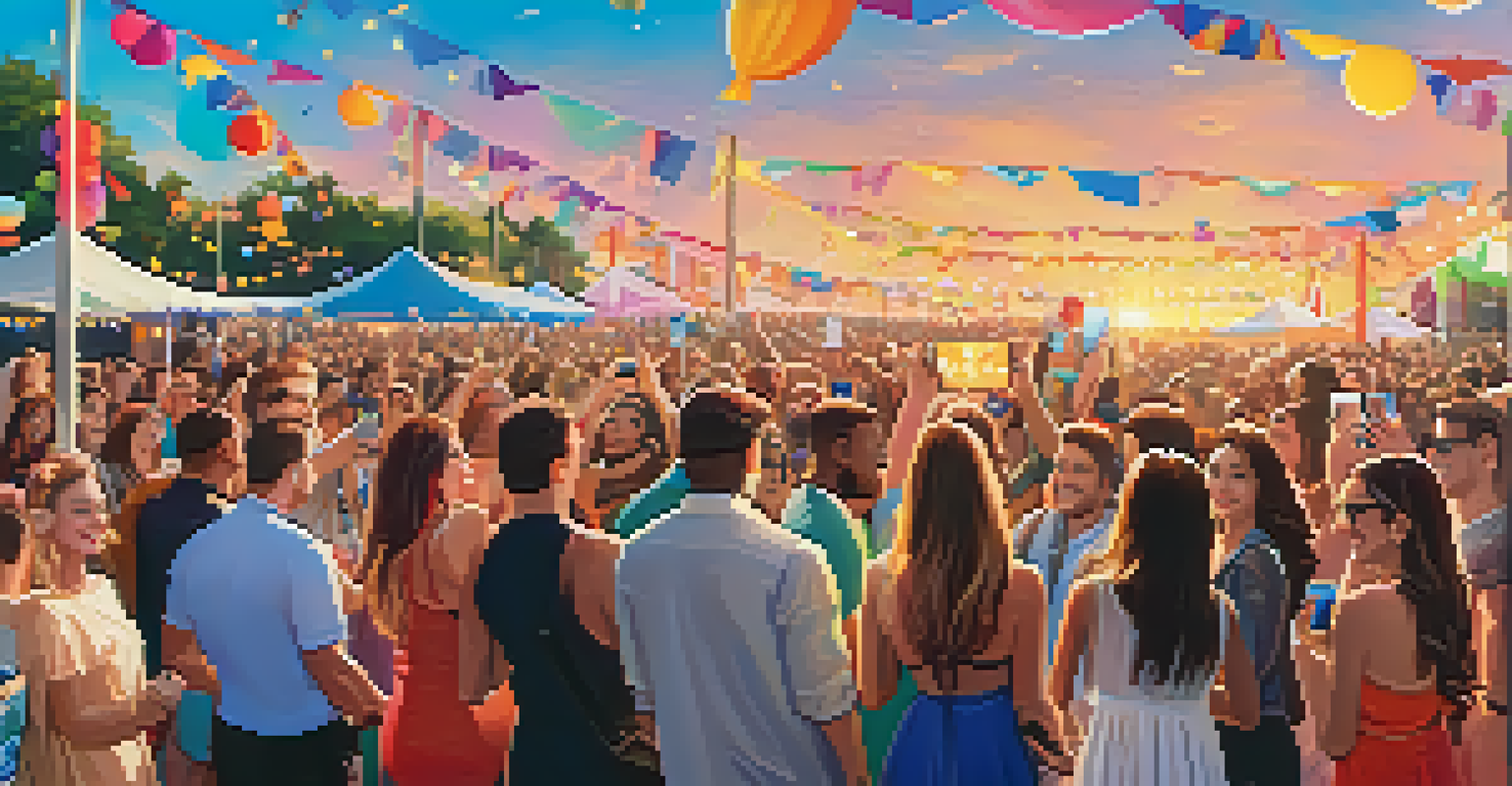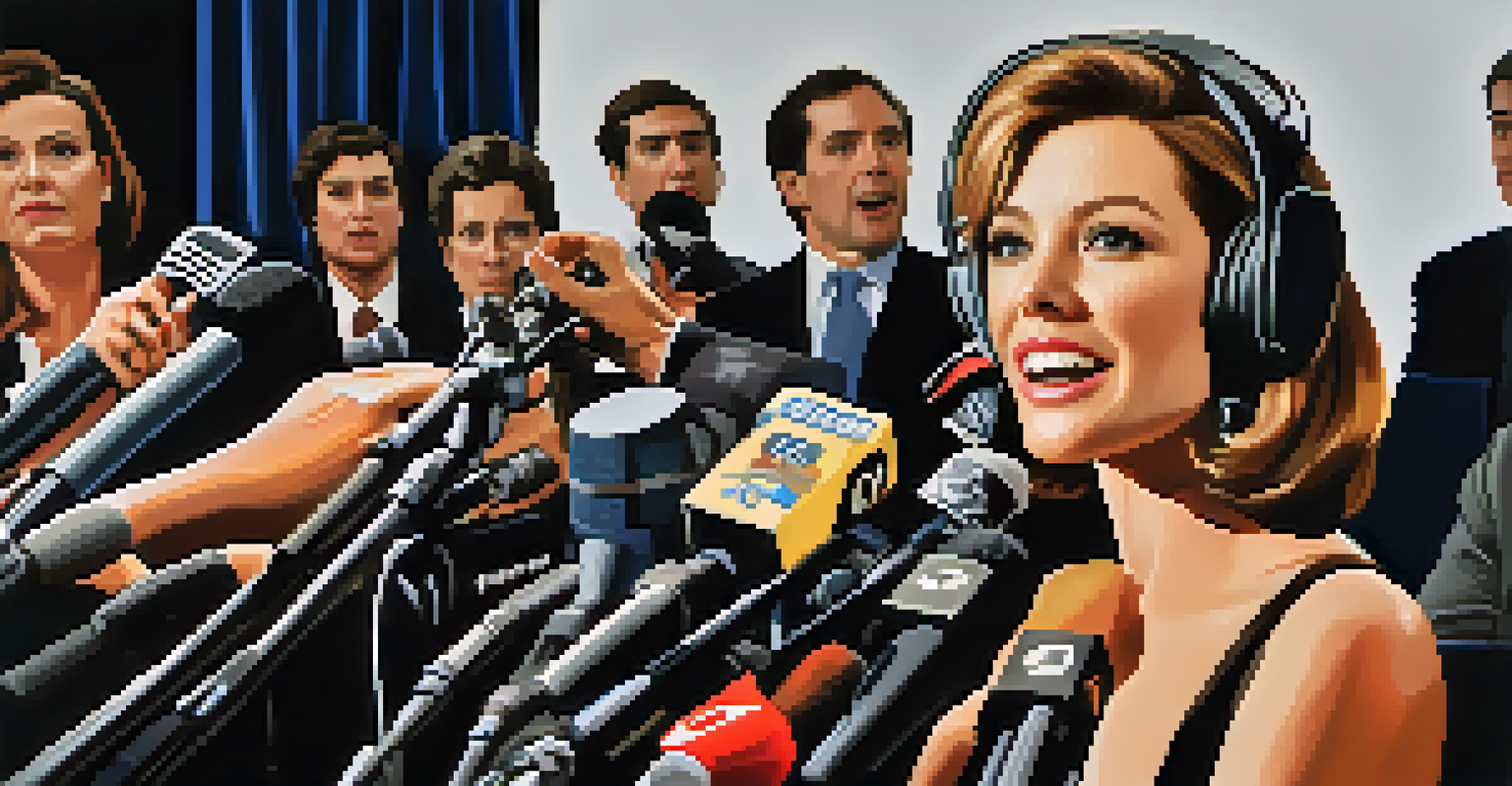The Dark Side of Social Media's Influence on Hollywood

Social Media: A Double-Edged Sword for Celebrities
In today’s digital age, social media platforms can make or break a celebrity's career. On one hand, these platforms enable stars to connect directly with their fans, fostering a sense of intimacy and loyalty. On the other hand, this direct line can lead to relentless scrutiny and criticism, putting immense pressure on public figures to maintain a flawless image. The challenge lies in balancing authenticity with the curated personas that often dominate social media.
Social media is both a blessing and a curse, it can build you up or tear you down.
For instance, think about how quickly a tweet or Instagram post can spark controversy. One misstep can lead to trending hashtags, potential boycotts, or even career-ending repercussions. Celebrities like Kevin Hart and Ellen DeGeneres have faced backlash, reminding us how social media can amplify mistakes and create a digital mob mentality. This constant threat of backlash can make even the most seasoned stars second-guess their every move.
Ultimately, while social media can be a powerful tool for engagement, it often comes with the dark side of public opinion. The pressure to stay relevant and keep up with trends can lead to burnout and mental health challenges for many in Hollywood. The need for validation through likes and shares can create a toxic cycle that’s hard to break.
The Rise of Cancel Culture in Hollywood
Cancel culture has emerged as a significant phenomenon in Hollywood, fueled largely by social media. It refers to the practice of withdrawing support for public figures after they have said or done something deemed objectionable. While accountability is essential, the speed and severity with which celebrities can be 'canceled' often seem disproportionate to their actions, leading to a climate of fear.

Consider how quickly an old tweet can resurface, leading to calls for a star's removal from projects or public events. This immediate response can overlook the context of the original comment and the possibility of personal growth. Stars like J.K. Rowling have faced intense backlash, sparking debates about free speech versus accountability. The nuances are often lost in the rapid-fire exchanges typical of social media platforms.
Social Media's Pressure on Celebrities
Celebrities face immense scrutiny and pressure to maintain a polished image on social media, which can lead to mental health challenges.
As a result, many celebrities may choose to self-censor their opinions or avoid engaging in societal issues altogether. This environment can stifle authentic conversations and discourage individuals from sharing their true selves. In the end, while social media can promote justice, it can also lead to an atmosphere of fear that limits dialogue and understanding.
Mental Health Struggles Among Celebrities
The pressures of social media can take a significant toll on the mental health of Hollywood stars. With constant scrutiny and unrealistic beauty standards perpetuated online, many celebrities struggle with anxiety and depression. This impact is often exacerbated by the need to maintain a polished public persona, which can be exhausting and alienating.
The price of fame is the loss of privacy, and the price of social media is the loss of freedom to be human.
Take the example of Selena Gomez, who has been open about her battles with mental health. Despite her success, she's shared how social media can amplify feelings of inadequacy and isolation. The pressure to appear 'perfect' can lead to harmful coping mechanisms, which ultimately affect personal well-being. Celebrities may feel trapped in a cycle of needing approval while battling their inner demons.
Moreover, the stigma around mental health in Hollywood can prevent stars from seeking help. Many fear that acknowledging their struggles could jeopardize their careers. This creates a dangerous situation, where the very tools designed to connect and uplift can contribute to a profound sense of loneliness and despair.
The Impact of Online Trolls and Harassment
Social media can often be a breeding ground for online trolls and harassment, posing a serious risk to celebrities. The anonymity afforded by the internet allows individuals to spew hateful comments without consequence, often targeting stars based on their appearance, choices, or beliefs. This harassment can be devastating, leading to severe emotional distress and impacting their public and personal lives.
For example, actress Millie Bobby Brown has frequently faced bullying online, which has affected her mental health and overall confidence. The relentless negativity can create a hostile environment, making it challenging for celebrities to navigate their careers. As a result, many are forced to develop thick skin or even take breaks from social media to protect their mental health.
Cancel Culture's Impact on Accountability
The rapid rise of cancel culture, amplified by social media, can lead to disproportionate backlash against celebrities, stifling open dialogue.
Unfortunately, this harassment isn't limited to just a few high-profile cases; it affects many in the industry. The psychological consequences can be long-lasting, leading to anxiety and a reluctance to engage with fans. Celebrities may find themselves caught in a cycle where they must weigh their desire for connection against the risk of being targeted.
The Role of Influencers in Shaping Public Perception
Influencers play a pivotal role in shaping public perception and trends within Hollywood, often blurring the lines between celebrity and influencer culture. Their ability to engage with audiences directly makes them powerful allies or adversaries for traditional stars. As influencers gain prominence, they can dictate the narrative around a film or show, impacting its success before it even hits the screens.
For instance, when a popular influencer endorses a movie, their followers may flock to theaters, swayed by their recommendation. Conversely, a negative review from a well-known influencer can spell disaster for a film's box office performance. This shift in power dynamics can create tension between traditional celebrities and influencers, leading to competition for relevance.
However, this relationship can also be beneficial. Collaborations between influencers and celebrities can lead to innovative marketing strategies that resonate with younger audiences. By leveraging social media reach, they can create buzz and excitement around projects. The challenge lies in navigating this new landscape where influence can be both a boon and a burden.
How Social Media Distorts Reality in Hollywood
Social media often creates a distorted reality, presenting an idealized version of celebrity life that can mislead audiences. The carefully curated posts and filtered images showcase glamour, luxury, and success, overshadowing the challenges faced by those in the industry. This can create unrealistic expectations for fans and aspiring entertainers, who may not see the hard work and dedication behind the scenes.
Think about how many 'perfect' vacation photos you see online, often leading to the feeling of inadequacy. Celebrities are not immune to this pressure; they too can feel compelled to showcase an ideal life that doesn't reflect their everyday struggles. This facade can lead to disconnection between stars and their fans, as the authenticity of their experiences is overshadowed by curated content.
Navigating Fame in the Digital Age
Finding balance in social media use is crucial for celebrities to protect their mental health while engaging authentically with fans.
Ultimately, while social media can serve as a platform for connection, it can also perpetuate a cycle of comparison and envy. The line between reality and performance becomes blurred, impacting both celebrities and their audiences. It's essential for all of us to remember that what we see online is often just a glimpse of a curated life.
Finding Balance: Navigating Fame in the Digital Age
In the face of social media's challenges, finding balance is crucial for celebrities navigating fame in the digital age. Many stars are learning to set boundaries, establishing a healthy relationship with social platforms. This could mean taking breaks, limiting the time spent online, or being selective about what they share. By prioritizing mental health, they can reclaim some control over their public image.
For instance, stars like Dwayne 'The Rock' Johnson have openly discussed their strategies for maintaining balance. By sharing personal stories and authentic moments, they create a relatable image while managing the pressures of fame. This approach fosters genuine connections with fans, allowing for a more fulfilling presence on social media.

Ultimately, the key lies in embracing authenticity while being mindful of the potential pitfalls of social media. Celebrities who can navigate this landscape with care will find that they can engage positively with their audience without compromising their well-being. It's a delicate dance, but one that many are learning to master.